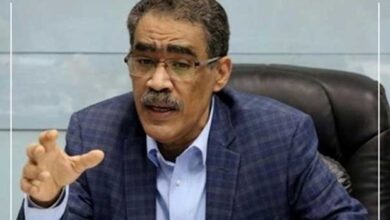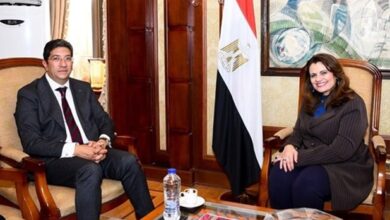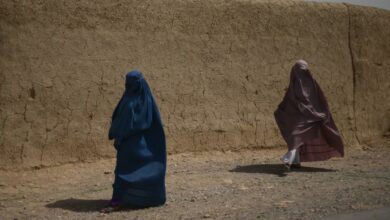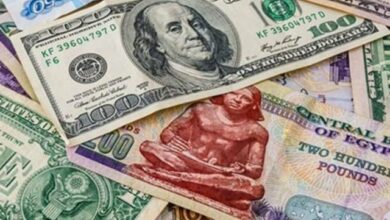In front of an enthusiastic crowd of hundreds at Cairo’s Journalists' Syndicate Wednesday night, Ahmed Mahir, the founder of the 6 April Youth Movement, announced the group’s future plans. 6 April had been engaged in internal debates over whether to become a political party in the aftermath of the 25 January revolution, which they had a hand in starting. But Mahir confirmed rumors that the group was likely, instead, to become a non-governmental organization advocating for civil liberties, democracy and human rights.
"If we become an NGO this will give us more legitimacy and make work easier," Mahir said.
Mahir’s announcement echoed the predictions of co-founders Ahmed Abdel-Aziz and Islam Saeed, voiced nearly two weeks ago in the movement’s newest office, a spacious apartment in Dokki. That night, a Libyan flag decorated the front door, but inside the discussion was local. A group of around 50 students and activists had gathered to discuss the ongoing upheaval at Cairo University, where students wanted to dismiss the NDP-connected dean, with the support of 6 April. The movement–largely credited in rallying support for the revolution–turned four years old yesterday. Their support means a lot.
The 6 April Youth Movement started on Facebook as a way of pledging solidarity to striking laborers in the industrial Egyptian town of Mahalla al-Kubra. At the time, Abdel Aziz told Al-Masry Al-Youm, Egypt was not a place workers felt they could strike. The events in Mahalla were, he said, “stand alone” and the 6 April Facebook page an “invitation to the whole country to participate.”
The Mahalla workers continue to fight for a living wage and improved working conditions, but the youth-led, internet solidarity initiative was something of a turning point. Although no one knew it then, as Mahir put it last night, "What happened in Mahalla in 2008 was a rehearsal for the revolution.”
The 6 April Facebook page attracted thousands of Egyptians, mostly young, for whom supporting the laborers was the first time they had been politically active. This “first-timer” narrative was an imperative element of the revolution, and will also be in the upcoming parliamentary and presidential elections.
The initiative followed on the heels of Kefaya, an umbrella protest movement that began in 2004 dedicated to challenging Hosni Mubarak’s undemocratic rule and speculation that he planned to install his son as president. Members of 6 April were arrested for their organizing efforts and consistently felt pressure from the regime, but persisted with their pro-democracy work.
Although labor rights began as the cornerstone of 6 April, four years later they chose not to support 27 March’s demonstration against the recent ban on protests, which mostly had a trade union presence. It was these workers who stood to lose the most should they be stripped of their right to strike, and presumably no one group understood this more than 6 April. Last night, Mahir criticized the law banning protests.
The group has, according to Abdel Aziz and Saeed, moved on from phase one, which they call the “revolution phase.” Now comes the “political phase”–finding ways to pressure a new government. The work now, Abdel Aziz and Saeed thought, would be behind the scenes debate and strategy. Still, both men admitted that they had underestimated the impact of street canvassing before the referendum on the constitutional amendments, which won approval, much to their surprise.
“We made a big mistake during the referendum,” Abdel Aziz said. “While the 25 January Youth were meeting with the Supreme Council of Armed Forces and appearing on TV, the Salafis and Muslim Brotherhood were on the streets. There is no doubt that we have to go down to the street to deliver the message face to face.”
The group’s surprise at the referendum result might represent the toughest hurdle for the 6 April group. The cluster of young activists, growing bigger by the day, accustomed not only to functioning from an internet control room but also being praised for that particular role in what is so often referred to as the “Facebook Revolution,” have learned the hard way that swaying individual votes online may in fact be only a virtual reality.
“The society of activists thought it was going to be ‘no,’” Abdel Aziz said of the referendum. “We were asking people how they would vote, but only on Facebook.” And, as the member admits, many of those who answered were not in the country or Egyptian citizens. They were part of a sizable and influential online solidarity campaign–vital to the revolution–but not representative of the voting public.
How the group will channel their considerable influence in their “political phase” remains unclear. Prior to the revolution, 6 April had been involved in Mohamed ElBaradei’s National Association for Change, rallying members to participate in the “door knocking” campaign. Their stance was resoundingly liberal. But even Abdel Aziz and Saeed expressed concern about rejoining ElBaradei’s bid for the presidency and claim the group is too large and politically diverse to support a single candidate.
The previous support for ElBaradei’s change front was rooted in backing “demands” rather than a “person,” Abdel Aziz said. The group’s unwillingness to support an individual candidate, even one they had campaigned with only months earlier, represents another hurdle. Can activists and voters overcome the suspicion of solo leadership in time to vote in the best leader? 6 April has a list of demands–to cleanse the government of remnants of the old regime, return Mubarak’s coffers to Egypt, set a 1200LE minimum wage–but its “political phase” is looking strikingly unpolitical.
“We believe that the Egyptian people on the grassroots level do not trust political parties,” Abdel Aziz said. “We represent the common dreams and common goals of the Egyptian people. Being a political party would only restrict us.”
Because of the group’s varied political leanings, 6 April would lose members by forming a political party, organizers fear. But whether or not a 6 April NGO will have pull in a country notorious for silencing such groups will depend largely on who comprises the new government. By deciding not to assert itself on the political scene, 6 April might also be foiling their chances of operating effectively outside of it.
But becoming an NGO is a smart way for the politically and socially diverse group to remain intact. And leaders hope that diversity and strength in numbers will lead to influence.
By staying on the political sidelines, the group will be able to maintain its role as watchdogs, organizers, and supporters. Or, as Abdel Aziz put it, they will be able to say to the government, “We are watching you. We will not let you create another dictatorship.” The difference now is that the government–and the world–will be returning the gaze.
Alastair Beach contributed to this report.




